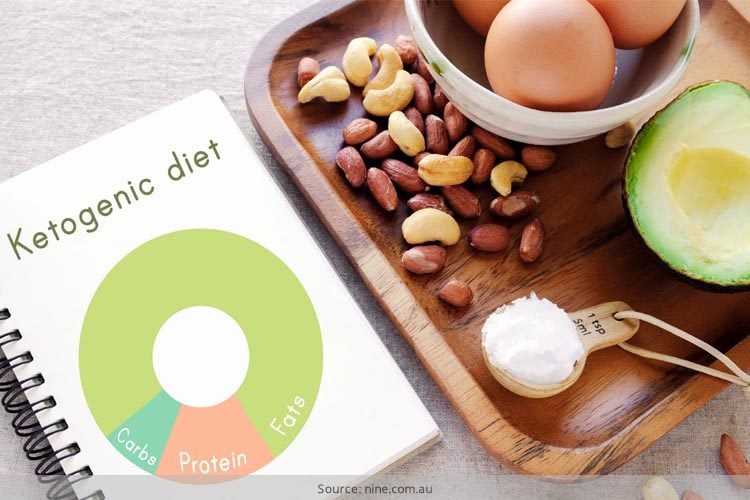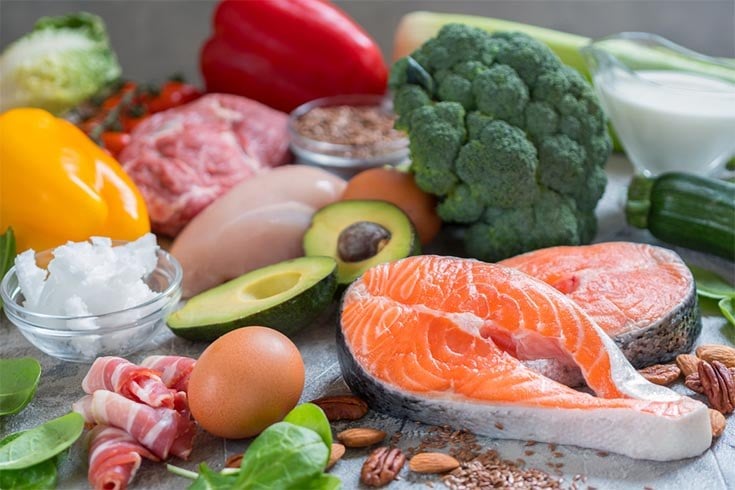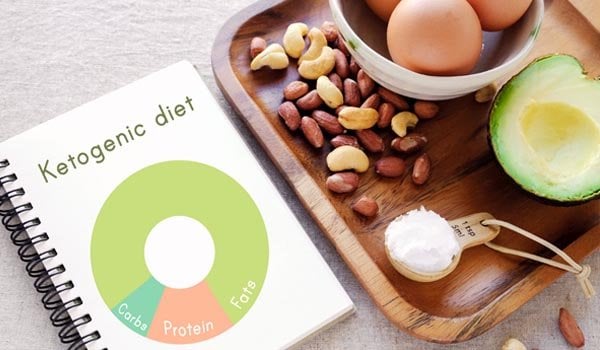
The ketogenic diet focuses on a high fat intake and minimizes the carb consumption. This unique diet boasts of many health benefits. There are over 20 studies which indicate the diet can help you lose weight and improve health. It can also help in treating several health concerns like diabetes, cancer, epilepsy, and Alzheimer’s disease.
Here is detailed information on everything you want to know about keto diet plan.
What Is Ketogenic Diet?
The ketogenic diet is also known as keto. It is a low-carb and high-fat diet which is similar to Atkins and other low-carb diets. It helps to reduce the intake of carbohydrates and replace it with fat. The decrease in carbs can put your body into a metabolic state known as ketosis.
When this state occurs, our body becomes active to burn fat for energy. During this process, fat also turns into ketones in the liver which can help to supply energy for the functioning of the brain.
The keto diet meal plan can also decrease blood sugar and insulin levels. It has numerous other health benefits, too.
Different Types Of Ketogenic Diet:
There are several types of ketogenic diet meal plan. They are as follows:
1. Standard Ketogenic Diet (SKD):
This is a low-carb, moderate-protein, and high-fat diet. It commonly contains 75% fat, 20% protein, and 5% carbs.
2. Cyclical Ketogenic Diet (CKD):
This diet involves periods of higher-carb re-feeds like five ketogenic days followed by two high-carb days.
3. Targeted Ketogenic Diet (TKD):
This type of diet allows you to add carbs before workouts.
4. High Protein Ketogenic Diet:
A high protein ketogenic diet is similar to standard ketogenic diet. The ratio is commonly 60% fat, 35% protein, and 5% carbs.
But, only the standard and high-protein ketogenic diets have been researched extensively. Other advanced methods like cyclical or targeted ketogenic diet are primarily used by athletes or bodybuilders.
How Can Ketogenic Diet Help To Lose Weight?
A ketogenic diet plan for fat loss is an effective method for losing weight and lowering risk factors for disease. In fact, the ketogenic diet plan for weight loss is so satisfying that you can lose weight without counting your calories. One study has revealed that people who are on a ketogenic diet lose 2.2 times more weight compared to those on a calorie-restricted low-fat diet. The HDL cholesterol levels and Triglyceride levels are also improved.
Other studies found that patients on a ketogenic diet lose three times more weight than those on Diabetes UK’s recommended diet.
[sc:mediad]
Other Health Benefits Of Ketogenic Diet:
The ketogenic diet was created as a means to treat neurological diseases, like epilepsy. Studies have revealed that the diet offers several benefits for treating several health conditions.
- Heart disease– The ketogenic diet can improve HDL levels and reduce body fat, blood pressure, and blood sugar levels.
- Cancer– This type of diet can help in the treatment of several types of cancer and slow tumor growth.
- Alzheimer’s disease– The diet can help to reduce Alzheimer’s symptoms and slow down the disease’s progression.
- Epilepsy– Studies have shown that the ketogenic diet can cause reductions in seizures among children suffering from epilepsy.
- Parkinson’s disease– One study has revealed that the ketogenic diet can help in managing the symptoms of Parkinson’s disease.
- Polycystic ovary syndrome– The ketogenic diet can help in reducing insulin levels and play an essential part in treating polycystic ovary syndrome.
- Brain Injury– One study has revealed that the ketogenic diet can reduce concussions and help in the recovery after brain injury.
- Acne– helps to control acne and breakouts.
But these studies are not conclusive and can vary.
Foods To Avoid
Foods that are high in carbs should be taken moderately. Here is a list of foods that need to be avoided while being on a ketogenic diet:
- Foods rich in sugar: Sweets and desserts along with juices and aerated drinks are strictly banned.
- Grains or starches: Wheat-based products, rice, pasta, cereal, etc.
- Fruit: All fruit, except small portions of berries like strawberries.
- Beans or legumes: Peas, kidney beans, lentils, chickpeas, etc.
- Root vegetables and tubers: Potatoes, sweet potatoes, carrots, parsnips, etc.
- Low-fat or diet products: These are highly processed and often high in carbs.
- Some condiments or sauces: These often contain sugar and unhealthy fat.
- Unhealthy fat: Limit your intake of processed vegetable oils, mayonnaise, etc.
- Alcohol: Again its carb-content makes it a strict no-no.
- Sugar-free diet foods: These are often high in sugar alcohols, which can affect ketone levels in some cases. These foods also tend to be highly processed.
Foods To Consume:
You should include most of these foods in your diet:
- Meat: Red meat, steak, ham, sausage, bacon, chicken, and turkey.
- Fatty fish: Such as salmon, trout, tuna, and mackerel.
- Eggs: Look for organic or omega-3 whole eggs.
- Butter and cream: Look for dairy products from grass-fed cattle when possible.
- Cheese: Unprocessed cheese (cheddar, goat, cream, blue or mozzarella).
- Nuts and seeds: Almonds, walnuts, flaxseeds, pumpkin seeds, chia seeds, etc.
- Healthy oils: Primarily extra virgin olive oil, coconut oil and avocado oil.
- Avocados: This fruit in any form is a must-have.
- Low-carb veggies: Most green veggies, tomatoes, onions, peppers, etc.
- Condiments: salt, pepper and various healthy herbs and spices.

Source: booksforbetterliving.com
Sample Ketogenic Diet For A Week:
Here is a sample keto diet plan for beginners:
Monday
- Breakfast: Bacon, eggs, and tomatoes
- Lunch: Chicken salad with olive oil and feta cheese
- Dinner: Salmon with asparagus cooked in butter
Tuesday
- Breakfast: Egg, tomato, basil and goat cheese omelet.
- Lunch: Have regular milk or almond milk without sugar.
- Dinner: Meatballs, cheddar cheese, and vegetables.
Wednesday
- Breakfast: A sugar-free milkshake.
- Lunch: Shrimp salad with olive oil and avocado.
- Dinner: Pork chops with Parmesan cheese, broccoli, and salad.
Thursday
- Breakfast: You can have an exotic omelet topped with bell peppers and avocados
- Lunch: You can have nuts and celery sticks with a salsa or avocado dip.
- Dinner: Chicken stuffed with pesto and cream cheese, along with vegetables.
Friday
- Breakfast: Sugar-free yogurt with peanut butter, cocoa powder, and stevia.
- Lunch: Beef stir-fry cooked in coconut oil with vegetables.
- Dinner: Meat cutlet with bacon, egg, and cheese.
Saturday
- Breakfast: Ham and cheese omelet with vegetables.
- Lunch: Ham and cheese slices with nuts.
- Dinner: Fish, egg, and spinach cooked in coconut oil.
Sunday
- Breakfast: You can have an exotic omelet topped with bacon and mushrooms.
- Lunch: You can have a bun-less burger with exotic dips of your choice.
- Dinner: Steak and eggs with a side salad.
You can include both veggies and meat for keto diet plan menu as both these types can provide several nutrients and health benefits.
Healthy Ketogenic Snack Options
Just in case you feel hungry in between meals, here are several healthy snack options:
- Fatty meat or fish
- Cheese
- A handful of nuts or seeds
- Cheese with olives
- 1–2 hard-boiled eggs
- 90% dark chocolate
- A low-carb milkshake with almond milk, cocoa powder, and peanut butter
- Smoothie with full-fat yogurt, peanut butter, and cocoa powder
- Strawberries and cream
- Celery with salsa and guacamole

Source: nutritionadvance.com
These are great snacks you can take while on a ketogenic diet.
Points To Remember While Following A Ketogenic Diet
It is not very tough to have ketogenic meals when eating out. Most restaurants offer several types of meats or fish-based dishes. You can order or prepare any high-fat food mixed with extra veggies.
Other options are egg-based meals, like an omelet, fried eggs, and bacon. In addition, a burger is also a good option. You can include veggies, avocado, eggs, and bacon in the burger. Skip the bun.
You can also have double cream with berries or a mixed cheese board for dessert.
Precautions and Prevention
Even though the ketogenic diet is safe for people, it might cause fa ew side effects. This is often referred to as keto-flu and is typically over within few days. Keto-flu includes symptoms like poor- energy, mental function, and increased- hunger, sleep issues, digestive discomfort, nausea, and decreased exercise performance.
For minimizing these negative aspects, you can opt for a regular low-carb diet for the first few weeks. This may allow your body to burn fat before eliminating carbs. A ketogenic diet can also alter the water and mineral balance in our body. So you should add extra salt to your meals or consume mineral supplements.
For a high mineral intake, take about 3000-4000 mg of sodium, 1000 mg of potassium, and 300 mg of magnesium daily to minimize side effects. Primarily, it is essential to eat until full and avoid taking too many calories. Typically, a ketogenic diet can lead to weight loss.
Supplements for Ketogenic Diet
Even though no supplements are essential, most of them are useful like MCT oil, ketones, and minerals.
- MCT oil: Add to drinks or yogurt, MCT oil provides energy and helps increase ketone levels.
- Minerals: You need to up your salt and water intake to rule out dehydration.
- Caffeine: provides energy, fat loss, and performance.
- Exogenous ketones: Raise the body’s ketone levels.
- Creatine: Provides numerous benefits for health and performance especially when you are working out while following the Keto Diet.
- Whey: Use half a scoop of whey protein in shakes or yogurt to increase your daily protein intake.
FAQs:
Here are a few questions and answers about the ketogenic diet:
1. Can a person take carbs again after the ketogenic diet?
Yes. But it is essential to eliminate them at the starting stage. For the first two to three months, you can take carbs for special occasions and return back to the keto diet immediately.
2. Will a person lose muscle?
There is a risk of losing muscle while being on any diet plan. But this diet minimizes it because you will go for a high protein intake.
3. Can a person build muscle while staying on a ketogenic diet?
Yes, a person can build muscle while on a ketogenic diet. It may not work well while being on a moderate-carb diet.
4. Do a person re-feed or carb load?
No. But a few higher-calories days may be more beneficial.
5. How much protein can a person consume?
Protein should be taken on a moderate basis. A higher intake of protein can increase insulin levels and lower ketones. About 35% of total calorie intake is possibly the upper limit.
6. Why do I feel tired and weak constantly?
If you feel tired easily, you can take supplements like MCT oil or ketones for best results.
7. What is the cause of foul-smelling urine and why is this?
This can simply be due to the excretion of byproducts generated during ketosis.
8. What is the reason for bad breath?
Bad breath is a common problem. You can prevent this by drinking naturally flavored water or chewing sugar-free gum.
9. Most people consider Ketosis harmful. Is this true?
Most people confuse ketosis with ketoacidosis. Ketosis is natural while ketoacidosis only occurs during uncontrolled diabetes. Ketoacidosis is dangerous but the ketosis in the ketogenic diet is normal and healthy.
10. How can a person treat digestion issues and diarrhea?
Stomach related problems like indigestion and diarrhea are common side-effects. It typically passes after three to four weeks. If it continues, try and see your doctor or dietitian. You can also take magnesium supplements to help with constipation.
Conclusion
A ketogenic diet is beneficial for people who are overweight, diabetic and those looking for ways to improve their metabolism. However, it might not be good for athletes wishing to add larger amounts of muscle fat or weight or needing high doses of energy for performance on the field. Like any other diet plan, it will only work if you consistently stick with it.
Now, you know all about the dos and don’ts of the Keto diet. Do give us a thumbs-up if you found this article interesting and informative.
